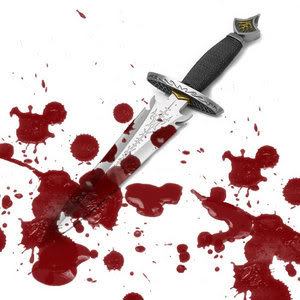 The way people act on the outside and who they really are on the inside may be two totally different things. Some may change because they feel they don’t fit in, while others pretend to be something they truly aren’t. Regardless of this, no matter which way you look at it, if you try to act like someone your not, the truth will always appear in the end. This the case in Macbeth.
The way people act on the outside and who they really are on the inside may be two totally different things. Some may change because they feel they don’t fit in, while others pretend to be something they truly aren’t. Regardless of this, no matter which way you look at it, if you try to act like someone your not, the truth will always appear in the end. This the case in Macbeth.
“There’s daggers in men’s smiles”
– Prince Donalbain to his brother Malcolm (II.iii.136)
In this line, the princes are concerned that those surrounding them aren’t what they seem. They believe that instead of being worried about their well-being, men are trying to harm them. An example of this falseness can be seen in Macbeth’s line following the royal court’s acknowledgement of King Duncan’s death.
“Who could refrain,
That had a heart to love, and in that heart
Courage to make’s love known”
Macbeth (II.iii.112)
Macbeth wants to make it seem as if he was very loyal to Duncan when Macduff asks him why he killed the guards. He wants to depict himself as a man of love and courage so that they will not suspect that he killed Duncan. Underneath all the of Macbeth’s acting as the king’s loyal subject, Macbeth is his worst enemy that killed him in his sleep.
This motif of appearance vs. reality appears again in the play when Macbeth goes to kill Duncan.
“Is this a dagger which I see before me,
This handle toward my hand? Come, let me clutch thee.
I have thee not, and yet I see thee still.
Art thou not, fatal vision, sensible
To feeling as to sight? Or art thou but
A dagger of the mind. a false creation,
Proceeding from the heat-oppressed brain?
I see thee yet, in a form as palpable
As this which now I draw”
– Macbeth (II.i.33-41)
This parts of the soliloquy show how Macbeth is so obsessed by thoughts of the murder that he starts to hallucinate. He reaches for his imaginary dagger but of course he can’t grasp it; it is a “false creation.” Like that he realizes that he is seeing the dagger that he plans to use to kill Duncan. This is the dagger that leads him toward King Duncan’s door and the dagger upon which appear thick drops of blood. The drops of blood foreshadow Duncan’s death. Macbeth hallucinates with a knife showing his true inner feelings and thoughts regarding murdering Duncan, instead of the brave and loyal appearance he puts on.
“A little water clears us of this deed”
– Macbeth (II.ii.65)
Lady Macbeth says this once her husband returns distraught after murdering King Duncan. Appearance-wise, little water would clean the blood out of Macbeth’s hands and absolve them from their crime, however, in reality, no matter how much they clean their hands, they will always (metaphorically) have blood in their hands and be haunted by this crime.